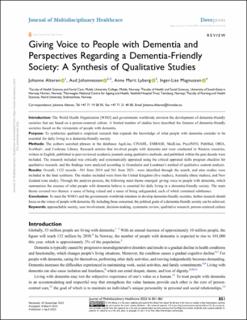| dc.contributor.author | Alteren, Johanne | |
| dc.contributor.author | Johannessen, Aud | |
| dc.contributor.author | Lyberg, Anne Marit | |
| dc.contributor.author | Magnussen, Inger-Lise | |
| dc.date.accessioned | 2024-02-15T09:28:18Z | |
| dc.date.available | 2024-02-15T09:28:18Z | |
| dc.date.created | 2023-04-12T13:43:20Z | |
| dc.date.issued | 2023 | |
| dc.identifier.citation | Alteren, J., Johannessen, A., Lyberg, A. M. & Magnussen, I.-L. (2023). Giving voice to people with dementia and perspectives regarding a dementia-friendly society: a synthesis of qualitative studies. Journal of Multidisciplinary Healthcare, 16, 851-861. doi: | en_US |
| dc.identifier.issn | 1178-2390 | |
| dc.identifier.uri | https://hdl.handle.net/11250/3117913 | |
| dc.description.abstract | Introduction: The World Health Organization [WHO] and governments worldwide envision the development of dementia-friendly societies that are based on a person-centered culture. A limited number of studies have described the features of dementia-friendly societies based on the viewpoints of people with dementia. Purpose: To synthesize qualitative empirical research that expands the knowledge of what people with dementia consider to be essential for daily living in a dementia-friendly society. Methods: The authors searched phrases in the databases AgeLine, CINAHL, EMBASE, MedLine, PsycINFO, PubMed, ORIA, SveMed+, and Cochrane Library. Research articles that involved people with dementia and were conducted in Western countries, written in English, published in peer-reviewed academic journals using qualitative methods, and published within the past decade were included. The research included was critically and systematically appraised using the critical appraisal skills program checklist for qualitative research, and the findings were analyzed according to Graneheim and Lundman’s method of qualitative content analysis. Results: Overall, 1122 records—561 from 2019 and 561 from 2021—were identified through the search, and nine studies were included in the final synthesis. The studies included were from the United Kingdom (five studies), Australia (three studies), and New Zealand (one study). Through the analysis process, the following main theme emerged: giving voice to people with dementia, which summarizes the essence of what people with dementia believe is essential for daily living in a dementia-friendly society. The main theme covered two themes: a sense of being valued and a sense of being safeguarded, each of which contained subthemes. Conclusion: To meet the WHO’s and the governments worldwide intention to develop dementia-friendly societies, further research should focus on the voices of people with dementia. By including those concerned, the political goals of a dementia-friendly society can be achieved. Keywords: approachable society, user involvement, decision-making, systematic review, qualitative research, person-centered culture | en_US |
| dc.description.abstract | Giving voice to people with dementia and perspectives regarding a dementia-friendly society : a synthesis of qualitative studies | en_US |
| dc.language.iso | eng | en_US |
| dc.publisher | Dove Medical Press | en_US |
| dc.relation.uri | https://doi.org/10.2147/JMDH.S398570 | |
| dc.rights | Navngivelse-Ikkekommersiell 4.0 Internasjonal | * |
| dc.rights.uri | http://creativecommons.org/licenses/by-nc/4.0/deed.no | * |
| dc.title | Giving voice to people with dementia and perspectives regarding a dementia-friendly society : a synthesis of qualitative studies | en_US |
| dc.type | Peer reviewed | en_US |
| dc.type | Journal article | en_US |
| dc.description.version | publishedVersion | en_US |
| dc.rights.holder | © 2023 The Author(s) | en_US |
| dc.source.pagenumber | 851-861 | en_US |
| dc.source.volume | 16 | en_US |
| dc.source.journal | Journal of Multidisciplinary Healthcare | en_US |
| dc.identifier.doi | 10.2147/JMDH.S398570 | |
| dc.identifier.cristin | 2140301 | |

